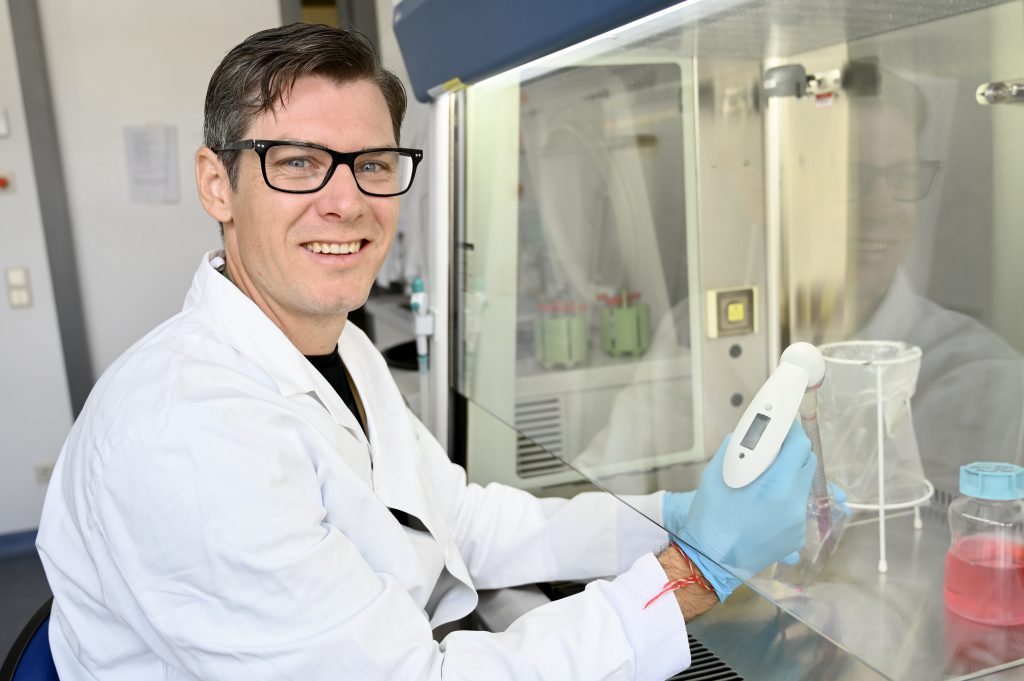Researchers investigate the control center for maintaining immune cell fitness
(Vienna, 14.03.2024) The endoplasmic reticulum in human immune cells is the topic of a current research project at the St. Anna Children’s Cancer Research Institute (CCRI). This highly complex network of membrane structures is where the cells proteins are produced and the quality control processes that ensure these proteins function properly; important reactions for maintaining cell fitness are also coordinated here. A team led by immunologists Kaan Boztug, MD, Scientific Director of the St. Anna Children’s Cancer Research Institute, and Senior Postdoc Michael Kraakman are now investigating how this important component of the cell is linked to a newly discovered immunodeficiency disorder and the tendency to develop tumors (tumor predisposition).
Genetic predispositions lead to tumors much more frequently in children than in adults. At least ten per cent of all childhood cancers develop in this way. Congenital immunodeficiencies, for example, can favor the development of tumors because cancer cells have a much easier time with a poorly functioning immune defense than under normal circumstances. This is why immunology has become a central component of modern pediatric cancer research.
With the support of the Austrian Science Fund FWF, research is now being conducted on a new genetic defect that negatively impacts the function of the endoplasmic reticulum and renders cells, particularly those of the adaptive immune system as debilitated. The scientists have identified four patients with this defect in their immune system: These four children have a mutation in a gene that encodes a protein involved in protein folding and protein degradation.
Both processes are essential for the health of the cell: protein folding is the process by which proteins obtain their three-dimensional structure and is the prerequisite for the flawless function of the protein. Protein degradation is crucial to remove aged, malformed and/or obsolete proteins to make room for new, correctly folded proteins. Clinically, the immunodeficiency results in frequent infections in all four cases and a predisposition to lymphoma.
New Zealand expert at the St. Anna Children’s Cancer Research Institute
The cell biologist Michael Kraakman, originally from New Zealand and the head of the FWF project, studied at the University of Otago and completed his PhD at the Monash University in Melbourne, Australia, before a postdoctoral project took him to Columbia University in New York. Since 2019, he has been working at the St. Anna Children’s Cancer Research Institute in the group of the Scientific Director Kaan Boztug. The study in question was started back then with initial data from two siblings, one of whom was able to survive the disease thanks to a bone marrow transplant.
Their work has shown that the gene mutation influences key processes in the endoplasmic reticulum, slows down the work of lymphocytes and reduces their survival. The endoplasmic reticulum provides proteins needed by the immune cells to respond and adapt quickly to invaders. However, for a proper immune response, these proteins must be correctly folded. Kraakman says: “If the protein produced fails to attain the correct three-dimensional shape, the cell must label it as misfolded and remove it.” If the cell were not to do so, misfolded proteins would accumulate within the cell, hindering the ongoing production of new proteins and impeding the cell to function appropriately. Therefore, the removal of misfolded proteins is vital.

Boztug emphasizes the “lymphoma predisposition of these children with this mutation”. “This is why these newly discovered diseases are so relevant in contemporary pediatric cancer research,” he says.